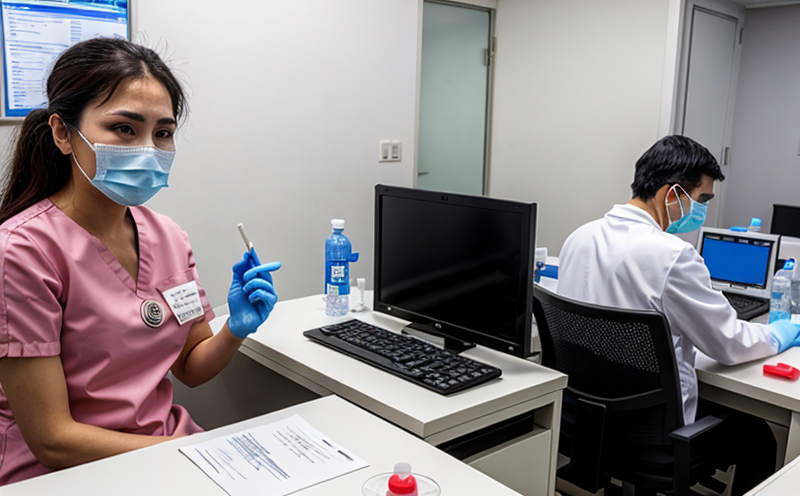Bluetongue Virus Antibody Testing in Ruminants
The Bluetongue virus (BTV) is a significant pathogen affecting ruminant livestock such as cattle, sheep, and goats. This viral disease causes severe economic losses due to reduced productivity, increased mortality rates, and the necessity for extensive control measures. The development of accurate and reliable antibody testing methods has become crucial in managing this disease effectively.
Bluetongue virus is classified under the family Reoviridae, genus Orbiviruses. It primarily affects ruminants, causing fever, lethargy, and sometimes fatal outcomes. The global spread of BTV has led to stringent control measures in various regions, emphasizing the need for precise diagnostic tools.
The primary goal of Bluetongue virus antibody testing in ruminants is to identify animals with protective immunity following vaccination or natural infection. This test is essential for herd management and disease surveillance programs. By identifying seropositive individuals, farmers can make informed decisions about herd health, breeding strategies, and the implementation of control measures.
The test involves a series of steps, starting from sample collection to result interpretation. The most common specimen type used in this testing is blood serum, which provides an accurate representation of the animal's immune response. Proper handling and preparation of these samples are critical for obtaining reliable results.
For accurate results, it is recommended that laboratories adhere strictly to international standards such as ISO 15189:2012 for quality management systems in medical laboratories. The test typically employs enzyme-linked immunosorbent assay (ELISA) or complement-fixation tests, both of which are reliable methods for detecting antibodies against the Bluetongue virus.
The interpretation of results is straightforward; a positive result indicates the presence of protective antibodies, suggesting either natural infection or vaccination. This information is invaluable in understanding herd immunity and making strategic decisions regarding herd health management. In contrast, negative results indicate the absence of detectable antibodies, which may suggest susceptibility to the virus.
The significance of this test extends beyond individual animal health; it plays a pivotal role in disease surveillance programs. By monitoring antibody titers over time, veterinarians and researchers can track the spread of the virus within regions and implement targeted interventions effectively. This approach not only enhances herd health but also contributes to broader public health measures.
In summary, Bluetongue virus antibody testing is a critical tool in managing ruminant health, particularly in regions where BTV poses significant threats. The test provides essential insights into herd immunity status and supports informed decision-making processes for livestock management. Its importance cannot be overstated as it directly impacts agricultural productivity and economic stability.
Why It Matters
The significance of Bluetongue virus antibody testing in ruminants extends beyond just the individual animal; it has far-reaching implications for public health, livestock management, and economic sustainability. Here are some key reasons why this test is critical:
Maintaining herd health: By identifying seropositive animals, farmers can take preventive measures to protect susceptible individuals.
Supporting disease surveillance programs: Regular monitoring of antibody titers helps in tracking the spread and prevalence of BTV within regions.
Enhancing economic stability: Reduced productivity due to illness translates directly into financial losses; effective management through testing minimizes these risks.
Fostering sustainable agriculture: Strategic use of this test supports informed decisions about herd health and breeding strategies, leading to more resilient livestock populations.
These factors underscore the importance of accurate and reliable antibody testing in managing Bluetongue virus infections among ruminants. Effective implementation of these tests contributes significantly to broader public health measures and agricultural sustainability.
Benefits
Maintains herd health by identifying seropositive individuals for targeted interventions.
Supports disease surveillance programs, aiding in the tracking of BTV prevalence within regions.
Enhances economic stability through minimized losses due to illness and increased productivity from healthy herds.
Fosters sustainable agriculture by enabling strategic decisions about herd health and breeding strategies.
In summary, the benefits of Bluetongue virus antibody testing in ruminants are substantial. This test not only aids in individual animal management but also contributes significantly to broader public health measures and agricultural sustainability.
Why Choose This Test
Selecting a reliable laboratory for Bluetongue virus antibody testing is crucial for obtaining accurate results. Here are several reasons why you should choose our service:
Adherence to international standards such as ISO 15189:2012 ensures the highest level of quality and reliability.
Experienced and skilled staff who specialize in virology and serology testing, ensuring accurate sample handling and interpretation.
State-of-the-art instrumentation for precise testing methods like ELISA or complement-fixation tests.
Dedicated support throughout the process, from specimen collection to result interpretation and reporting.
We offer comprehensive services tailored to meet your specific needs in managing ruminant health. Our commitment to excellence ensures that you receive accurate and reliable results, which are crucial for informed decision-making processes.





